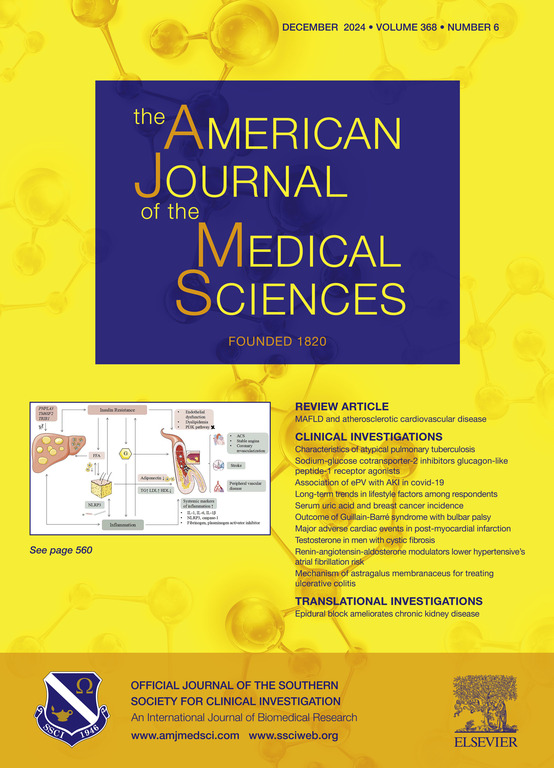mRNA - COVID-19疫苗的意外肾副作用单中心体验和简短回顾。
IF 2.3
4区 医学
Q2 MEDICINE, GENERAL & INTERNAL
引用次数: 0
摘要
背景:2019年底,世界卫生组织宣布2019年冠状病毒病为全球紧急情况。从那时起,研制了许多疫苗来对抗大流行。数百万人接种了一种获批的COVID-19疫苗;不幸的是,也记录了一些不良事件。方法:在当地卫生系统中,患者可接种mRNA疫苗(辉瑞- biontech或Moderna)、腺病毒载体疫苗(阿斯利康)或基于灭活病毒的疫苗(科华)。我们调查了我科在COVID-19疫苗接种后发生的免疫介导的不良事件。结果:我们评估了本中心6例接种mRNA疫苗并出现疑似免疫介导不良事件的患者。免疫介导的不良事件以新生或复发的肾小球疾病为特征,经皮肾活检进一步证实。在两年多的随访中,5名患者出现缓解,其中1名患者肾小球肾炎持续存在。结论:疫苗接种是有效保护和预防各种流行病的关键。因此,必须对疫苗接种后的不良事件保持高度警惕。这种高度的怀疑导致更早地发现、更好地理解和最佳地预防和管理这些事件。为此,有必要制定具体的疫苗/患者风险概况,以便有选择地对目标人群进行分类。本文章由计算机程序翻译,如有差异,请以英文原文为准。
Unexpected renal side effects of mRNA COVID-19 vaccines; a single-center experience and short review
Background
In late 2019, the World Health Organization declared Coronavirus disease 2019 a global emergency. Since then, many vaccines have been developed to combat the pandemic. Millions of people have received one of the approved COVID-19 vaccines; unfortunately, some adverse events also have been recorded.
Methods
In the local health system, patients could get either mRNA vaccines (either Pfizer-BioNTech or Moderna), adenoviral vector vaccine (AstraZeneca), or the vaccine based on inactivated virus (Sinovac). We investigated what immune-mediated adverse events occurred in our department after the COVID-19 vaccination.
Results
We evaluated six patients from our center who received mRNA vaccines and developed suspected immune-mediated adverse events. The immune-mediated adverse events are characterized by de novo or relapsing glomerular diseases and are further confirmed with percutaneous kidney biopsies. During A follow-up of more than two years, remission occurred in five patients, and glomerulonephritis persisted in one of them.
Conclusions
Vaccinations are pivotal in effectively protecting and preventing various epidemics. As such, it is essential to maintain a high level of vigilance concerning post-vaccination adverse events. This heightened level of suspicion leads to earlier detection, better understanding, and optimal prevention and management of these events. To this end, developing a specific vaccine/patient risk profile is necessary to categorize the target population selectively.
求助全文
通过发布文献求助,成功后即可免费获取论文全文。
去求助
来源期刊
CiteScore
4.40
自引率
0.00%
发文量
303
审稿时长
1.5 months
期刊介绍:
The American Journal of The Medical Sciences (AJMS), founded in 1820, is the 2nd oldest medical journal in the United States. The AJMS is the official journal of the Southern Society for Clinical Investigation (SSCI). The SSCI is dedicated to the advancement of medical research and the exchange of knowledge, information and ideas. Its members are committed to mentoring future generations of medical investigators and promoting careers in academic medicine. The AJMS publishes, on a monthly basis, peer-reviewed articles in the field of internal medicine and its subspecialties, which include:
Original clinical and basic science investigations
Review articles
Online Images in the Medical Sciences
Special Features Include:
Patient-Centered Focused Reviews
History of Medicine
The Science of Medical Education.

 求助内容:
求助内容: 应助结果提醒方式:
应助结果提醒方式:


